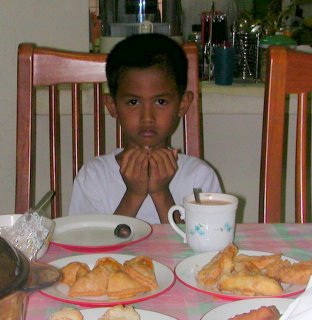> 5 phone calls ... "tak de ape" "saje nak talipon" conversations
Tuesday, February 14, 2006
Monday, February 13, 2006
HANDKERCHIEF
 Last weekend Mak went out to shop for HANDKERCHIEF ... for the boys ...
Last weekend Mak went out to shop for HANDKERCHIEF ... for the boys ...Why ?
My neighbour (physically and virtually) Gartblue dah growling and I thought I should teach my kids some manner on how to behave in public ...
Friday, February 10, 2006
Berpuasa sunat 10 Muharam

Menanti saat berbuka ...
Sila lihat meja yang penuh sarat dengan berbagai juadah.
 Tiba masa untuk berdoa ...
Tiba masa untuk berdoa ... 
Akhirnya masa untuk makan tiba ... Alhamdullilah ...

Seperti biasa pelakon tambahan, yang tidak berpuasa, turut memeriahkan meja makan dan tidak ketinggalan hebatnya.
Cerita-ceriti yang sewaktu dengannya ... 6th Ramadhan 1426H
Thursday, February 09, 2006
Cucu Eyang Umurnya 10 tahun dahhhh

Sambutan Ulangtahun ke 10 Ahmad Danial bin Ahmad Rahimy ...
Happy Birthday to you ...
Happy Birthday to Ahmad Danial ...
May Allah bless you with Nur and Iman ... and the WILL TO WALK ...

Ahmad Danial dikelilingi sepupu-sepapat.
Nota kaki :
Ini adalah gambar fail. Majlis ini berlangsung Bulan Disember 2005 di BJ.
Mak sedara ni baru jumpa balik gambar ni semalam :)
Maaf yea terlambat siarannya.
Wednesday, February 08, 2006
Tuesday, February 07, 2006
Monday, February 06, 2006
Hosting 7 BOYS !
Saturday, February 04, 2006
What Would Muhammad Do?
The following is taken from www.cair-net.org
-----------------------------------------
What Would Muhammad Do?
By Ibrahim Hooper
[Ibrahim Hooper is National Communications Director for the
Washington-based Council on American-Islamic Relations (CAIR), the
nation's largest Muslim civil liberties group. He may be contacted
at: ihooper@cair-net.org ]
"You do not do evil to those who do evil to you, but you deal with
them with forgiveness and kindness." (Sahih Al-Bukhari)
That description of Islam's Prophet Muhammad is a summary of how he
reacted to personal attacks and abuse.
Islamic traditions include a number of instances of the prophet
having the opportunity to strike back at those who attacked him, but
refraining from doing so.
These traditions are particularly important as we witness outrage in
the Islamic world over cartoons, initially published in a Danish
newspaper, that were viewed as intentional attacks on the prophet.
Peaceful and not-so-peaceful protests have occurred from Gaza to
Indonesia. Boycotts have targeted companies based in Denmark and in
other nations that reprinted the offensive caricatures.
We all, Muslims and people of other faiths, seem to be locked into a
downward spiral of mutual mistrust and hostility based on self-
perpetuating stereotypes.
As Muslims, we need to take a step back and ask ourselves, "What
would the Prophet Muhammad do?"
Muslims are taught the tradition of the woman who would regularly
throw trash on the prophet as he walked down a particular path. The
prophet never responded in kind to the woman's abuse. Instead, when
she one day failed to attack him, he went to her home to inquire
about her condition.
In another tradition, the prophet was offered the opportunity to have
God punish the people of a town near Mecca who refused the message of
Islam and attacked him with stones. Again, the prophet did not choose
to respond in kind to the abuse.
A companion of the prophet noted his forgiving disposition. He
said: "I served the prophet for ten years, and he never said `uf' (a
word indicating impatience) to me and never blamed me by saying, `Why
did you do so or why didn't you do so?'" (Sahih Al-Bukhari)
Even when the prophet was in a position of power, he chose the path
of kindness and reconciliation.
When he returned to Mecca after years of exile and personal attacks,
he did not take revenge on the people of the city, but instead
offered a general amnesty.
In the Quran, Islam's revealed text, God states: "When (the
righteous) hear vain talk, they withdraw from it saying: `Our deeds
are for us and yours for you; peace be on to you. We do not desire
the way of the ignorant'. . .O Prophet (Muhammad), you cannot give
guidance to whom you wish, it is God Who gives guidance to whom He
pleases, and He is quite aware of those who are guided." (28:55-56)
The Quran also says: "Invite (all) to the way of thy Lord with wisdom
and beautiful preaching, and argue with them in ways that are best
and most gracious: for thy Lord knows best who have strayed from His
Path and who receive guidance." (16:125)
Another verse tells the prophet to "show forgiveness, speak for
justice and avoid the ignorant." (7:199)
These are the examples that Muslims should follow as they express
justifiable concern at the publication of the cartoons.
This unfortunate episode can be used as a learning opportunity for
people of all faiths who sincerely wish to know more about Islam and
Muslims. It can also be viewed as a "teaching moment" for Muslims who
want to exemplify the prophet's teachings through the example of
their good character and dignified behavior in the face of
provocation and abuse.
As the Quran states: "It may well be that God will bring about love
(and friendship) between you and those with whom you are now at
odds." (60:7)
Taken from: www.cair-net.org
-----------------------------------------
What Would Muhammad Do?
By Ibrahim Hooper
[Ibrahim Hooper is National Communications Director for the
Washington-based Council on American-Islamic Relations (CAIR), the
nation's largest Muslim civil liberties group. He may be contacted
at: ihooper@cair-net.org ]
"You do not do evil to those who do evil to you, but you deal with
them with forgiveness and kindness." (Sahih Al-Bukhari)
That description of Islam's Prophet Muhammad is a summary of how he
reacted to personal attacks and abuse.
Islamic traditions include a number of instances of the prophet
having the opportunity to strike back at those who attacked him, but
refraining from doing so.
These traditions are particularly important as we witness outrage in
the Islamic world over cartoons, initially published in a Danish
newspaper, that were viewed as intentional attacks on the prophet.
Peaceful and not-so-peaceful protests have occurred from Gaza to
Indonesia. Boycotts have targeted companies based in Denmark and in
other nations that reprinted the offensive caricatures.
We all, Muslims and people of other faiths, seem to be locked into a
downward spiral of mutual mistrust and hostility based on self-
perpetuating stereotypes.
As Muslims, we need to take a step back and ask ourselves, "What
would the Prophet Muhammad do?"
Muslims are taught the tradition of the woman who would regularly
throw trash on the prophet as he walked down a particular path. The
prophet never responded in kind to the woman's abuse. Instead, when
she one day failed to attack him, he went to her home to inquire
about her condition.
In another tradition, the prophet was offered the opportunity to have
God punish the people of a town near Mecca who refused the message of
Islam and attacked him with stones. Again, the prophet did not choose
to respond in kind to the abuse.
A companion of the prophet noted his forgiving disposition. He
said: "I served the prophet for ten years, and he never said `uf' (a
word indicating impatience) to me and never blamed me by saying, `Why
did you do so or why didn't you do so?'" (Sahih Al-Bukhari)
Even when the prophet was in a position of power, he chose the path
of kindness and reconciliation.
When he returned to Mecca after years of exile and personal attacks,
he did not take revenge on the people of the city, but instead
offered a general amnesty.
In the Quran, Islam's revealed text, God states: "When (the
righteous) hear vain talk, they withdraw from it saying: `Our deeds
are for us and yours for you; peace be on to you. We do not desire
the way of the ignorant'. . .O Prophet (Muhammad), you cannot give
guidance to whom you wish, it is God Who gives guidance to whom He
pleases, and He is quite aware of those who are guided." (28:55-56)
The Quran also says: "Invite (all) to the way of thy Lord with wisdom
and beautiful preaching, and argue with them in ways that are best
and most gracious: for thy Lord knows best who have strayed from His
Path and who receive guidance." (16:125)
Another verse tells the prophet to "show forgiveness, speak for
justice and avoid the ignorant." (7:199)
These are the examples that Muslims should follow as they express
justifiable concern at the publication of the cartoons.
This unfortunate episode can be used as a learning opportunity for
people of all faiths who sincerely wish to know more about Islam and
Muslims. It can also be viewed as a "teaching moment" for Muslims who
want to exemplify the prophet's teachings through the example of
their good character and dignified behavior in the face of
provocation and abuse.
As the Quran states: "It may well be that God will bring about love
(and friendship) between you and those with whom you are now at
odds." (60:7)
Taken from: www.cair-net.org
Wednesday, February 01, 2006
Subscribe to:
Comments (Atom)










